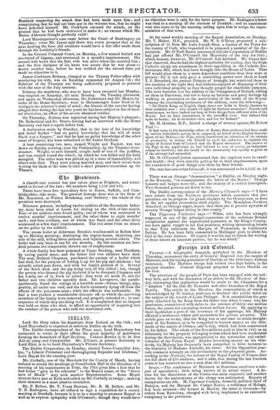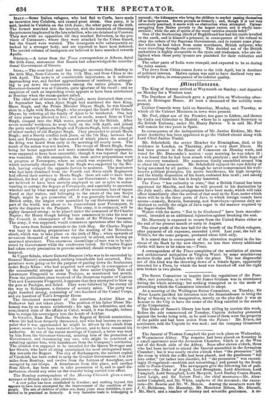jortign an Colonial.
FRANCE.—A telegraphic despatch, published in the Moniteur of
Thursday, announces the entry of General Bugeaud into the empire of Morocco, and his taking possession of Ouchda 00 the 16th June, without resistance. The Morocco troops had retired two days before, in the greatest disorder. General Bugeaud proposed to leave Ouchda on the 21st.
The attention of the peopleof Paris has been engaged-with the rail- way bills, and with the discussion of an article in the Moniteur of Sun- day, intimating that application would be made to the Chambers for a " dotation " for the Due De Nemours and other branches of the Royal. Family. The article in the Monitcur, the responsibility of which is
acknowledged by 51. Guizot, professes to disabuse the public mind on the subject of the wealth of Louis Philippe. It is asserted that the pro- perty inherited by the King from his father was, when it came into his possession, encumbered with debts to the amount of thirty-one million
francs, the assets not exceeding sixteen million francs. By applying to their liquidation a part of the revenues of his appanage, his Majesty
effected a settlement which still encumbers his private property. The article goes on to say, that the King was at one time so much straight- ened in his finances, as to be compelled to borrow money on the title- deeds of the canals of Orleans and Loing, which had been constructed
by his father. The whole of the five millions paid to him in 1825 as an indemnity for the property belonging to him which had been confiscated-
during the Revolution, was appropriated to the restoration and embel-
lishment of the Patois Royal. Besides borrowing money on his title- deeds, his Majesty has frequently been compelled to have recourse to the liberality of Madame Adelaide, his sister. All the Opposition jour- nals comment strongly on this preliminary to the proposed grant. Ac- cording to the National, the income of the Royal Family of France does not fall short of 270 millions; and it adds, that during the last fourteen years it has received no less a sum than 385 millions.
SPAIN.—The conference of Ministers at Barcelona continues a sub- ject of speculation ; little being known of its actual object. A de- cree for the dissolution of the Cortes was daily expected, and another decree for the maintenance of the clergy was anticipated. Reports of conspiracies are rife. M. Cayetano Cardero, formerly political chief of Badajoz, and the Marquis De Campo-Nuevo, a nobleman of Malaga, had been arrested—the former at Madrid, the latter at Granada—by orders from Barcelona, charged with being implicated in an extensive conspiracy in the provinces. ITALT.—Some Italian refugees, who had fled to Corfu, have made an incursion into Calabria, and caused great alarm. One party, it is
said, landed in Calabria on the 16th June; the other party on the 20th.
The former marched into the interior, with the intention of liberating the prisoners implicated in the late rebellion, who are detained at Cozenza. They met with no opposition till they reached Belvedere, in the pro- vince of Catanzaro ; where they were attacked by the Urban Guard, but the Guard were worsted. The insurgents were subsequently at- tacked by a stronger body, and are reported to have been defeated. The second column of insurgents are believed to have marched towards Apulia.
GREECE.—A letter from the Times correspondent at Athens, dated the 20th June, announces that Russia had acknowledged the constitu- tional Government of Greece.
INDIA.—The over-land mail has brought accounts from Bombay to the 20th May, from Calcutta to the lith May, and from China to the 10th April. The news is of considerable importance, as it indicates approaching war, and further aggrandizement of territory, in attempt- ing to put down the contentions among the native princes. The Governor-General was at Calcutta, quite ignorant of his recall ; and no suspicion of such an impending event appears to have been entertained at Bombay when the steam-packet sailed. The chief seat of interest is the Punjaub ; more distracted than ever. In September last, when Ajeet Singh had murdered the then King, Shere Singh, and the Prime Minister Dhyan Singh, he was himself slain in a fight with Heera Singh ; who avenged the death of his father, Dhyan, by ordering all the family of Ajeet to be butchered. One boy of nine years was allowed to live ; and an uncle, named Ittur or Utter Singh, escaped into the Sikh states, protected by the British. After seven months' residence, he went back on the 30th April, and joined the party under Cashmeera Singh and Peshora Singh, both sons (though of minor ranks) of old Runjeet Singh. They proceeded to attack Heera Singh ; and a bloody conflict took place, on the 7th May, between La- hore and Ferozepore ; at the last-named of which places the sound of the firing was heard from early in the morning till nearly noon. The result of the action was not known. The troops of Heera Singh, from being far better appointed and more numerous than their opponents, were supposed to have been successful ; though it was reported that he was wounded. On this assumption, the most active preparations were in progress at Ferozepore, where an attack was expected ; the belief which universally obtained that Ittur Singh was supported by the Bri- tish, having enraged the opposite faction to madness. The mutineers who had been dismissed from the Fourth and Sixty-ninth Regiments had offered their services to Heera Singh : these are said to have been declined, for fear of giving offence to our Government ; but the men are believed to have been secretly employed to act as spies in endea- vouring to corrupt the Sepoys at Ferozepore, and especially to ascertain whether and by what means any portion of the seventeen lees of rupees found at that station, and belonging to the estate of the late Soojet Singh, might be got possession of. It was generally believed that a British army, the largest ever assembled by our Government in any part of the world, was about to be concentrated near Ferozepore, to settle the disputes in the Punjaub. This army, it is estimated, will be eighty thousand strong; to be placed under the command of Sir Charles Napier ; Sir Henry Gough having been summoned to take his seat at the Council, in consequence of the death of Sir William Casement. The army, it was supposed, would commence operations after the rains.
The news from Scinde extends to the 16th May. Sir Charles Napier was busy in making preparations for the meeting of the Beloochee chiefs, which was to take place on the 24th of May ; when upwards of seventeen thousand of them were expected to attend, each having an unarmed attendant. This enormous assemblage of men was to be sub- sisted by Government while the conference lasted. Sir Charles Napier had taken every precaution to prevent mischief, should treachery be at- tempted. In Upper Scinde, where General Simpson (who was to be succeeded by General Hunter) commanded, nothing remarkable had occurred. Pre- parations were going on for the purpose of putting down the freebooters under Beeja Khan ; who had acquired new strength in consequence of the unsuccessful attempt made by the force under Captain Tait and Lieutenant Fitzgerald to storm Poolajee, as mentioned last month. From the particulars since received of the disastrous repulse of Captain Tait and Lieutenant Fitzgerald, it appears that they attempted to blow up the gate at Poolajee, and failed. They were followed by the enemy all the way to Shikarpore, a distance of seventy miles. The party was eight hundred strong, consisting of two hundred of the Camel Corps, and six hundred of Tait's Irregular Horse. The threatened movement of the notorious Ackbar Khan on Peshawar had not taken place. The position of his father Dhost Ma- homed was by no means satisfactory : his age, his infirmities, and the complicated state of the affairs at Cabul, would, it was thought, induce him to resign his sovereignty into the hands of Ackbar. In Gwalior, Ram Rao Phalkem, the Regent of British nomination, whose life had been formerly threatened, and who had become so unpo- pular that it was apprehended he might be driven by the chiefs from power, seems to have been restored to favour, and to have resumed his authority. At one of the recent meetings of Council, a letter was read by him from the Governor-General, assuring him of the protection of Government, and threatening any one, who might be convicted of caballing against him, with banishment from the Company's territories. The allusion was supposed to be intended for the Queen Dowager and her friends, who have all along entertained the most undisguised hosti- lity towards the Regent. The city of Burhampore, the ancient capital of Candeisb, has been ceded to us by the Gwalior Government : it is 280 miles from Bombay, and twelve from the fortress of Assergbur, now occupied by our troops. A detachment from this place, and another from Mhow, has been sent to take possession of it, and to quell dis- turbances, should any arise on the transfer being carried into effect.
The Bombay correspondent of the Morning Chronicle gives a sorry account of British rule in this province.
" A new police has been established in Gwalior; and nothing beyond this appears to have been attempted for the improvement of the condition of the people. The sale of children of either sex, many years since forbidden, is per- mitted to be practised as formerly. A very lucrative trade in kidnapping is pursued; the kidnappers who bring the children to market passing themselves off as their parents. Suttee prevails as formerly ; and, though it is not very extensively practised, it meets with no obstruction when attempted. Opium- smuggling from Malwa prevails to the largest extent, and is wholly unre- strained; while the sale of spirits of the worst varieties exceeds belief."
One of the freebooting chiefs of Bogbilkund has bad his castle levelled to the earth, and is himself a prisoner, in consequence of his refusal to obey the orders of the Supreme Government, and to restore some plun- der which he had taken from some merchants, British subjects, who were travelling through the country. This decided act of the British authorities is highly acceptable to the ryots and tradesmen, who are de- lighted when those petty tyrants are punished for their robberies and insolence.
The other parts of India were tranquil, and expected to be so during the rainy season. The news from China comes down to the 10th April, but is destitute of political interest. Malwa opium was said to have declined very ma- terially in price, in consequence of its inferior quality.



























 Previous page
Previous page